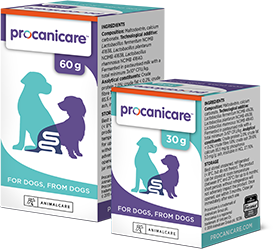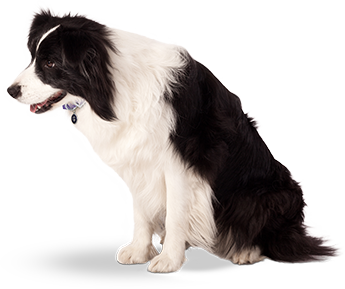The first
FOR DOGS,
FROM DOGS
GI SUPPORT



Procanicare™ may be helpful in dogs that are:
Changing diets or taking antibiotics, which can upset the balance in a dog’s gut flora
Older or have sensitive stomachs, as these dogs often have fewer beneficial Lactobacillus bacteria
Traveling or staying in kennels, which can contribute to a ‘stress gut’
Pregnant or lactacting females to maintain a healthy gut flora

Procanicare™ is a complementary feed designed specially for dogs using 3 canine strains of live Lactobacillus bacteria isolated from healthy dogs.3 Whenever GI support is needed, Procanicare™ supports a dog’s gut flora by reducing ‘bad’ bacteria and by helping a dog’s own ‘good’ bacteria grow.1,5
Different dogs and situations will require GI support for different periods of time—suggested periods of administration are provided below. Always follow your veterinarian's advice.
*For pregnancy and lactation, two 30-day dosing schedules can be used with a short break in between.
In 1997, Dr. Shea Beasley’s dog, Denny, was born. Denny was a Border Collie with a very sensitive stomach. Dr. Beasley knew she needed to do something to help Denny and other dogs with the same problem. That led to her PhD research on human and animal lactic acid bacteria (LAB)—and her findings that led to the development of Procanicare™. Now Denny’s legacy lives on, helping dogs everywhere maintain their GI health.

During the development of Procanicare™, Dr. Beasley and her colleagues published the following studies.
For region-specific news and promotions, please select your country/language-specific page from the drop-down menu at the top of the page.


1. Gómez-Gallego C, Junnila J, Männikkö S, et al. A canine-specific probiotic product in treating acute or intermittent diarrhea in dogs: a double-blind placebo-controlled efficacy study. Vet Microbiol. 2016;197:122–128. 2. Kumar S, Pattanaik AK, Sharma S, et al. Comparative assessment of canine-origin Lactobacillus johnsonii CPN23 and dairy-origin Lactobacillus acidophillus NCDC 15 for nutrient digestibility, faecal fermentative metabolites and selected gut health indices in dogs. J Nutr Sci. 2017;6:e38. 3. Beasley SS, Manninen TJ, Saris PE. Lactic acid bacteria isolated from canine faeces. J Appl Microbiol. 2006;101:131–138. 4. Grześkowiak Ł, Collado MC, Beasley S, Salminen S. Pathogen exclusion properties of canine probiotics are influenced by the growth media and physical treatments simulating industrial processes. J Appl Microbiol. 2014;116:1308–1314. 5. Manninen TJ, Rinkinen ML, Beasley SS, Saris PE. Alteration of the canine small-intestinal lactic acid bacterium microbiota by feeding of potential probiotics. Appl Environ Microbiol. 2006;72:6539–6543.
